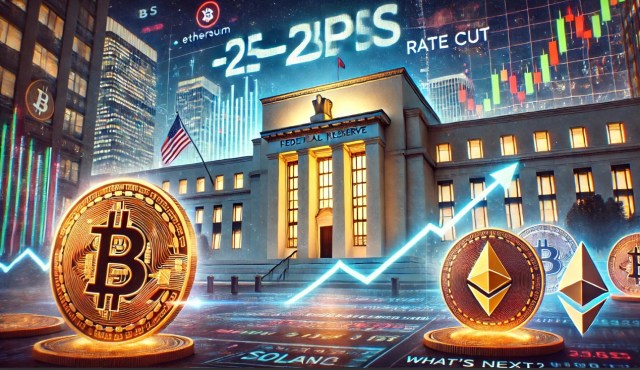Bitcoin Holdings Boost GameStop’s Q2 2025 Performance, Delivering $15.6M In Unrealized Gains
American video game retail giant GameStop (NYSE: GME) has once again defied expectations by announcing a robust return to profit in the second fiscal quarter of the year, thanks to its strategic and substantial investment in Bitcoin as a treasury reserve asset.
The Texas-based company synonymous with 2021’s “meme stock” phenomenon reported a net profit of $168.6 million, or $0.31 per GME share, for the quarter. This figure beat analysts’ expectations of $0.16 per share, signalling a resurgence for the struggling publicly traded firm. On an adjusted basis, it achieved earnings of $138.3 million, or $0.25 per share.
GameStop Yearly Revenue Soars to $972 Million, Beating Wall Street Expectations
GameStop’s year-over-year revenue increased by 21.8% to $972.2 million, from $798.3 million in Q2 2024, comfortably exceeding Wall Street projections of $823 million. This was a strong showing compared to Q1 2025, when, despite delivering a profitable quarter, it was hit by a 15% decline in YoY revenue due to undertaking aggressive cost-cutting measures.
The company also reported a net loss of $18.5 million for the quarter ended August 2, compared to a profit of $44.8 million in the prior three months. Revenue slipped from $732.4 million in the previous quarter to $673.9 million, weighed by declines across gaming hardware and software sales.
GameStop’s Q2 rebound suggests that its strategic initiatives, which include a leaner operating model, diversification into collectibles, and a significant foray into digital assets, are beginning to yield substantial results. The company disclosed that it purchased 4,710 BTC between May 3 and June 10, 2025, for approximately $513 million at an average price range of $93,000 to $112,000 per coin.This aligns with corporate strategy approved by the board to add addition of Bitcoin to its treasury reserve assets.
BTC is up 18% since May 2025, boosting GME’s Price
At the end of the quarter, these bitcoins were valued at $528.6 million, generating an unrealized gain of $15.6 million. According to the company’s filing, it used Coinbase’s pricing to measure fair value during each reporting period. Bitcoin’s price has risen about 18% since the beginning of Q2 in May, which helped bolster the carrying value of GameStop’s holdings.
The video game retailer’s return to profitability comes following a multi-year financial restructuring journey that began after Ryan Cohen was appointed as CEO in late 2023. He adopted strategies such as focusing on e-commerce expansion, supply chain optimization, and significantly reducing its physical store footprint by divesting in Canada and France. This year, the company managed to raise $2.7 billion through a convertible notes offering, boosting its finances and positioning itself for potential future Bitcoin additions.
GameStop ended the quarter with $6.1 billion in cash and equivalents, excluding its digital asset holdings. Operational losses fell from $10.8 million in Q1 2025 to $9.2 million in the last quarter. This was aided by lower selling, general, and administrative costs for the company. Collectibles like trading cards and pop-culture merchandise accounted for nearly a third of the Q2 sales.
Investor Sentiment for GameStop Turns Positive as Bitcoin Adoption Strategy Pays Off
The company’s first foray into the crypto market was in 2021, when it attempted to build an Ethereum NFT marketplace, followed by a digital collectible wallet in 2022. However, both initiatives were dropped early last year due to the risk of regulatory uncertainty in the U.S. and GameStop suffering substantial losses. This led to the firing of its former CEO, Matt Furlong, and CFO, Mike Recupero, and the layoff of employees across its businesses between 2023 and 2024. Furlong was instrumental in leading the company’s push into blockchain and NFTs.
The GME stock experienced a positive reaction following the release of the Q2 earnings report. GameStop’s shares were up 1.5% on the day, rising as high as 5.7% to $24.94 in after-hours trading. The initial reaction to the company’s Bitcoin investment announcement back in June was rather mixed, with GME facing a decline, reflecting investors’ concerns regarding the highly volatile nature of crypto assets. However, with BTC now contributing positively to the video game retailer’s balance sheet, coupled with profitability across its core business, market sentiment is shifting, positioning GameStop as a hybrid retail-crypto firm.
At the time of writing, GameStop (GME) shares are priced at $23.59, while Bitcoin (BTC) is trading at $112,290, down 0.61% in the last 24 hours.
Also Read : Best NFT to Buy in 2025: Top Picks for Profitable Digital Collectibles
The post Bitcoin Holdings Boost GameStop’s Q2 2025 Performance, Delivering $15.6M In Unrealized Gains appeared first on BiteMyCoin.
You May Also Like

Franklin Templeton updates XRP ETF filing for imminent launch

Fed Lowers Rates By 25bps: How Bitcoin And Crypto Prices Responded And What’s Next

Canada’s budget promises laws to regulate stablecoins, following US
Canada’s government unveiled a plan to regulate stablecoins, requiring fiat-backed issuers to maintain sufficient reserves and adopt robust risk management measures. Canada is set to introduce legislation regulating fiat-backed stablecoins under its federal budget for 2025, following the footsteps of the US, which passed landmark stablecoin laws in July.Stablecoin issuers will be required to hold sufficient reserves, establish redemption policies and implement various risk management frameworks, including measures to protect personal and financial data, according to the government’s 2025 budget released on Tuesday.The Bank of Canada would allocate $10 million over two years, starting in the 2026-2027 fiscal year, to ensure everything runs smoothly, followed by an estimated $5 million in annual costs that will be offset from stablecoin issuers regulated under the Retail Payment Activities Act.Read more